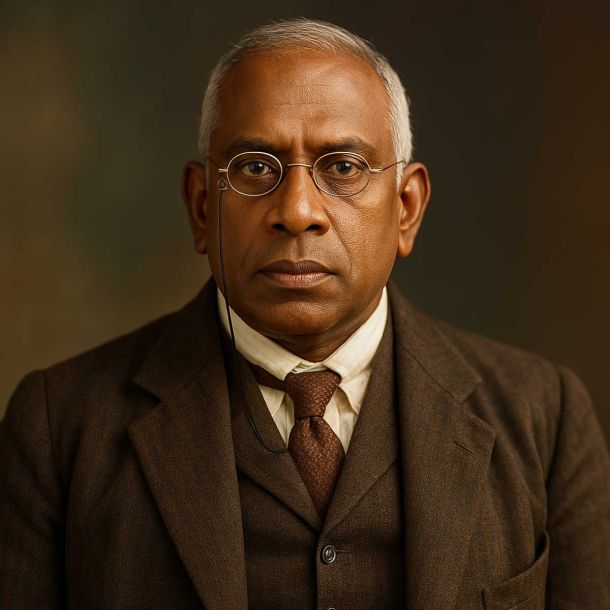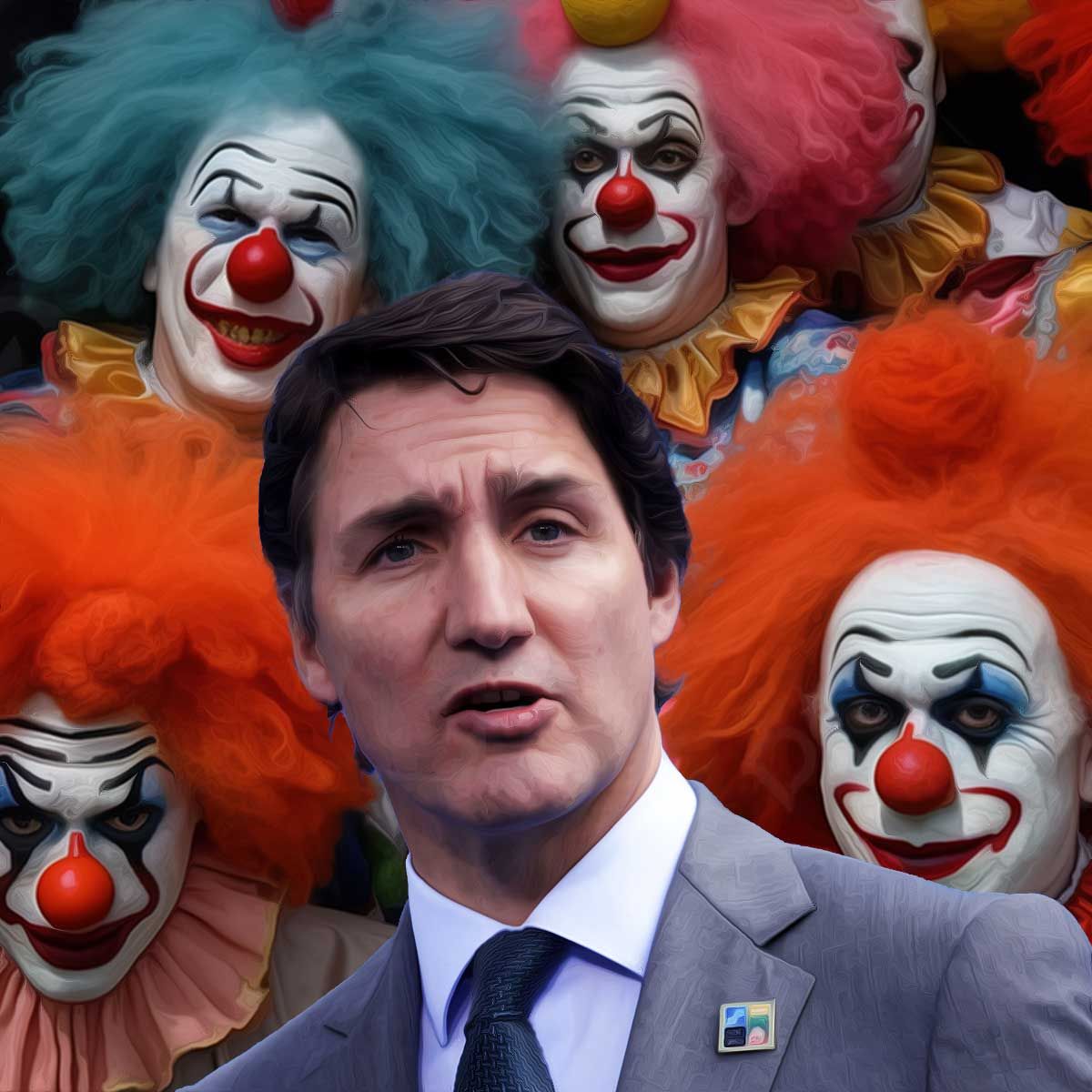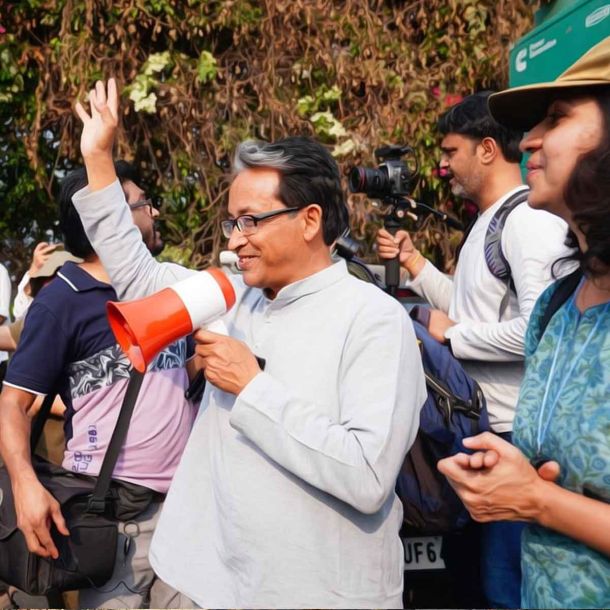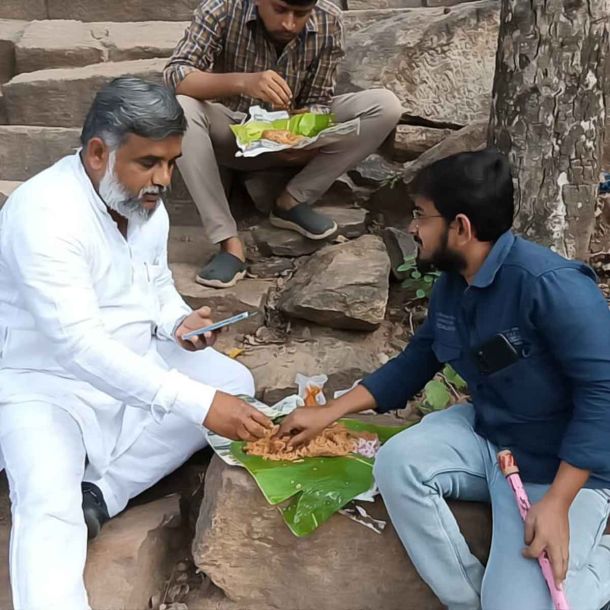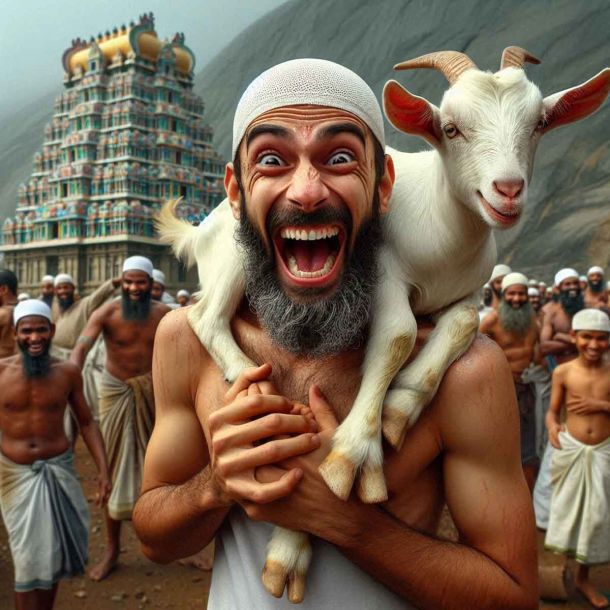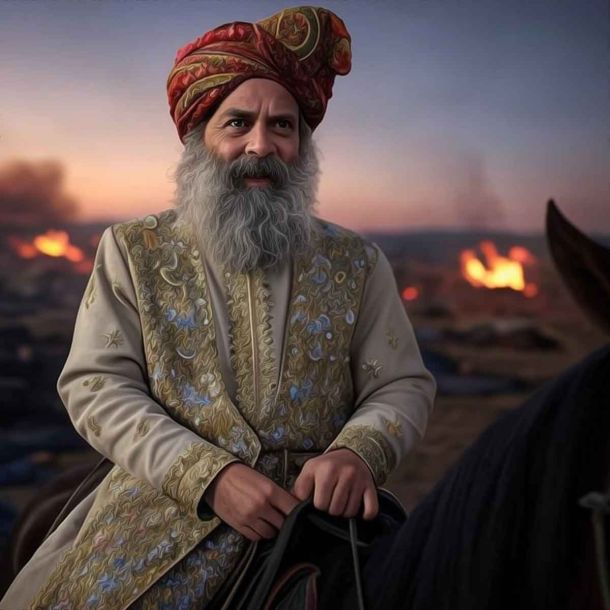MORE COVERAGE
"In public realm, secularism should not concede a single inch to religious intrusions": India never knew a theocratic state till Islam entered Bharat, Hindu Dharma always was a pluralistic religion till genesis of Nehruvian Secularism for mystic reasons

More than two decades back Sita Ram Goel was invited to a seminar on 'Hurdles To Secularism'. It was presided over by the late Shri Jayaprakash Narayan (JP). The Working Paper had been prepared by the late Professor AB Shah. It was a surprising departure from the usual norm of such papers. While he had repeated the current cliches about Hindu communalism, Professor Shah had been equally unsparing about what he had nailed down as Muslim communalism.
In the event, however, the paper remained irrelevant to the discussion that took place. The several speakers that rose, one after another, became red in the face and foamed at the mouth as they fulminated against Hindu society for denying employment to Muslims in the public as well as the private sector, for reducing the Muslim minority to the status of second class citizens, for committing untold atrocities on the poor and helpless Muslims in a repeated round of riots, and so on so forth.
All these speakers wore Hindu names. The most vociferous of them was Balraj Puri who has managed to masquerade for many years as a martyr in the service of what he proclaims to be humanist causes.
There were four or five Muslim participants present in that seminar. One of them was a professor of Arabic from a leading university. Another was a lawyer well-known for his championing all communist and Islamic causes at all times. They were invited to speak next. But they all smiled and said that they had nothing to add to what their Hindu brethren had already said so loudly and so lucidly.
And then all of a sudden there were some fireworks from the same silent and satisfied Islamic fraternity. They had all stood up, shaking with uncontrollable rage, and were shouting at the same time, He is lying! They were pointing their fingers at the gentleman who had been invited to speak by the president, and who had said only a few sentences. Balraj Puri kept sitting. But he looked as if he would burst out of his skin.
This was the late Hamid Dalwai. He was a tall man with a slight stoop, a smiling face, and a rather relaxed self-possession. He was saying, All that has been said about Hindu communalism today is nothing new. We have heard it for the nth time. The intention of the working paper of this seminar, however, was to highlight for the first time what has so far been ignored by all progressive people who swear by secularism.
What I want to expose today is Muslim communalism which has already divided the motherland, and which is still strong enough to poison our body-politic
Hamid continued:
Hindu society has produced many communalists. Admitted. But it has also produced men like Mahatma Gandhi who went on a fast unto death to save the Muslims of Bihar from large-scale butchery. It has produced men like Pandit Jawaharlal Nehru who had the Bihari Hindus bombed from the air when they did not respond to the Mahatmas' call. These have not been isolated men in Hindu society, as Rafi Ahmad Kidwai and MC Chagla have been in Muslim society. The Mahatma was a leader whom the whole Hindu society honored. Pandit Nehru has been kept as Prime Minister over all these years by a majority vote of the same Hindu society.
Now let me give you a sample of the leadership that Muslim society has produced so far and in ample measure. The foremost that comes to my mind is Liaqat Ali Khan, the first Prime Minister of Pakistan. Immediately after the partition, there was a shooting in Sheikhupura in which many Hindus who were waiting for repatriation in a camp, were shot down. There was a great commotion in India, and Pandit Nehru had to take up the matter in his next weekly meeting with Liaqat Ali in Lahore. The Prime Minister of Pakistan had brought the Deputy Commissioner of Sheikhupura with him. The officer explained that the Hindus had broken out of the camp at night in the midst of a curfew, and the police had to open fire. Pandit Nehru asked as to why the Hindus had broken out of the camp. The officer told him that some miscreants had set the camp on fire. Pandit Nehru protested to Liaqat Ali that this was an amazing explanation. Liaqat Ali replied without batting an eye that they had to maintain law and order. This exemplifies the quality of leadership which Muslim society has produced so far.
All hell now broke loose as the Islamic fraternity stood up again, and started shouting that they had not come to the seminar to be insulted by a hired hoodlum of the RSS fascists. JP could restrain them no more and declared the proceedings closed with a note of anguish in his voice. Hindu champions of Secularism avoided Hamid as if he was a snake.
Genesis of Secularism in Europe
What has Secularism come to mean in the Indian context? How did the concept arise? Who were those that gave it its current shape and content? For sure, Secularism in its present Indian form is no more than an embodiment of anti-Hindu animus and is supported by all those who want to destroy Hindu society and culture.
Secularism is essentially a political concept that originated and took shape in nineteenth-century Europe. Till about the middle of the 18th century, the State in all European countries was allied with one denomination or another of the splintered Christian Church. In fact, the State was described by the Church as its secular arm. It was not unoften that the State carried out pogroms against heretics and dissidents at the behest of the dominant Christian denomination. The King of England is still described as Defender of the Faith whenever the full array of his titles is trotted out. This is a relic and a reminder of that dark period in European history when the king in every country was used by the Church to maintain its stranglehold, and when he used the Church in turn to sustain his unbridled despotism.
Then came the Enlightenment when the exclusive claims of Christianity were questioned, and a wave of anti-clericalism attracted the intellectual elite in all European countries. This was followed by the rising tide of rationalism and humanism, fostered and fed by the empiricism of modern science. The churches defended their dogmas very doggedly. But there was very little in those dogmas which could survive a ration or moral scrutiny. That was why the Church had needed a secular arm to maintain its monopoly of truth for more than fourteen hundred years.
It was in this atmosphere of revolt against Christianity and its closed culture that the concept of Secularism was evolved and employed in the country after country in Europe. The secular power of the State was no longer to be the secular arm of the Church. It was to become secular on its own, that is, a power that secured equal rights to all its citizens without bothering about their beliefs. The Church was separated from the State which was no longer supposed to interfere with the religious life of the citizens or to discriminate against any citizen on the basis of his on her religion or absence of it. Religion was now to be treated as a purely private matter in which the state was not supposed to pry, and which was not to be projected into public affairs.
Hindu Society has always been Secular
Hindu Dharma has always been a pluralistic religion. Hindu culture and society too have been pluralistic throughout their hoary history. It was, therefore, impossible for the Hindus to erect an established church or to proclaim a state religion and call upon the State to impose it by force. India had never known a theocratic state till the advent of Islam in the country in the first quarter of the eighth century AD. The Hindu state extended its patronage to all religious sects equally, even when a king and his courtiers adhered to a particular sect in their private lives. Religious strife followed by bloodshed had never blackened the fair face of Hindu society.
Things changed radically when Islamic imperialism invaded India and brought with it a fully developed theory as well as the apparatus of a theocratic state. The Islamic State had already destroyed by fire and sword the ancient religions of the Arabs, the Persians, and the Turks. It started to do the same in India and succeeded to a large extent in several parts of the North-West. But the resistance offered by the Hindu nation in the rest of the country was too strong. The Mughals under Akbar had to abandon the experiment in order to save and extend their empire. And the Islamic state met the fate it deserved when Aurangzeb tried to reverse the trend.
The Hindu experience of a theocratic state was a very painful experience, spread as it was over several centuries. Even so, the Hindus did not learn any lessons in a theocracy. The Hindu states which re-emerged under the Rajputs, the Marathas, the Sikhs, and the Jats were secular states which did not molest the Muslim population in spite of Hindu memories of what Islam had done to Hindu religion and culture during the days of its domination. The same Secularism characterized the national movement for freedom from British imperialism which was manned overwhelmingly by the Hindu masses. Hindu leaders tried their best to take along the Muslim masses in the fight for freedom.
The Rising tide of Muslim Revivalism
Muslim society in India on the other hand, which consisted almost entirely of those whose forefathers had been converted by force, started throwing up one revivalist movement after another throughout the period of British rule. All these movements reminded Muslim society that it had lost political power in India due to its own fall from the faith, that it had to purify itself in the image of the first four Khalifas who had founded the worldwide Islamic empire, and that it could not and should not rest till it recaptured political power and restored its theocratic state. It is on record that every one of these movements turned into a jihãd against the Hindus wherever the latter were found in a minority and unable to defend themselves. Some of the Muslim fanatics got killed in these encounters and were hailed by Muslim society as martyrs (shahîds) for the greater glory of Islam.
Muslim society in India looked at the freedom movement with suspicion and frequently denounced it as a Hindu conspiracy to capture power to the detriment of Islam. The British had started feeling the impact of the freedom movement in the opening years of the twentieth century. They saw an ally in Islamic revivalism and made up their mind to pit it against a nation in revolt. The foundation of the Muslim League in 1906 was a command performance at the instance of a British Viceroy as is now very well known. It followed immediately after the partition of Bengal (1905) in order to carve out a Muslim majority province in the east of India. Muslim society now started staking its claims for a lion's share whenever the British were forced to make any concessions to the freedom fighters.
By the time Mahatma Gandhi appeared on the scene, the Muslim League had acquired a position which the British could play up on every bargaining counter between Indian nationalism on the one hand and British imperialism on the other. The mischievous message conveyed by the British rulers was that it was not they who were blocking India's progress towards freedom but the Hindus themselves by their refusal to come to terms with the Muslim minority. At the same time, the British made it clear that they were not going to quit under Hindu pressure and leave the Muslim minority to the tender mercies of a brute Hindu majority.
Mustafa Kamal created an illusion of Hindu-Muslim unity in India for as long as it lasted. The streets in most Indian cities resounded with the emotionally surcharged slogan of Hindû-Muslim-Bhãî-Bhãî which frightened the British authority, at least for the time being.
|
The curtain was raised on the reality behind the rhetoric when the Moplah Muslims of Malabar started another jihãd against their Hindu neighbors who were caught uncautioned and unprepared. The British had to send some armed forces before the Muslim butchery of innocent Hindus could be brought under control. The Moplah violence was the opening scene of unprecedented riots staged by Muslims all over India. The Muslim leaders were once more taking it out on the Hindus for their frustration over Khilafat. It was the same story all over again - music before a mosque, or a pig in a Muslim mohalla, or a private fracas between two toughs belonging to the two communities. The Muslims have never needed a more substantial excuse whenever they are in a nasty mood. Nor has the nasty mood been able to mend itself for long because of the continued Muslim failure to recapture power all over India and re-establish their lost empire. In case the Hindus failed to provide the necessary provocation, the Muslims could always slaughter a cow in the presence of Hindus, abduct and molest a Hindu girl in keeping with the best behests of Islam, or take out a rowdy tãjiã procession through a thoroughfare thickly populated by Hindus.
The need of the situation was to remind Hindu society that Muslim objection to music before the mosque was a legacy of Islamic imperialism under which the kãfirs were not allowed to celebrate their religious and social festivals loudly and that cow-slaughter and tãjiã processions through Hindu mohallas were discriminatory privileges enjoyed by Muslims during the days of their dominance. Muslim society had to be told in no uncertain terms that Islamic rule in India was no more and that the privileges enjoyed by the Muslim and the disabilities imposed on the Hindus were not going to be tolerated. At the same time, Hindu society had to prepare itself to meet effectively the violence to which Muslim society had become addicted under inspiration from the Quran and the Sunnah of the Prophet.
Genesis of Secularism in India
But Hindu society did not take any of these steps, though there were several voices that warned this society to mend its fences while there was still some time. The Indian National Congress came to be increasingly dominated by constitutionalists who wanted to settle with the Muslim League on terms of the latter's choosing in order to be in a better position to bargain with the British. And failing to persuade Muslim society to shed its separatism, these constitutionalists started training all their guns against those who objected to Islamic revivalism or criticized it as an obstacle in the path of national progress towards freedom. Congress started undergoing a transformation that was fraught with fatal consequences. In the process, the phrase Hindu communalism gained currency as a pejorative phrase.
The constitutionalists were soon reinforced and then replaced by a brood of Leftists most of whom were educated in the West where they had caught the contagion of Communist thought categories. Their animus against Hindu society to which they belonged by accident of birth was incurable because they had pawned their brains on what they glorified as progressivism. It was these Leftists who branded Indian nationalism as Hindu communalism and then placed this swearology at the service of Islamic separatism in India. It was these Leftists who converted the Hindu-Muslim conflict into a class conflict in which Hindus were presented as the parasitic landlords and capitalists and the Muslims as the poor peasants and the proletariat whom Hindus were out to exploit and oppress.
What followed was inevitable. The Indian National Congress surrendered to Islamic separatism in stages, and finally sold millions of people to slaughter and slavery on both sides of the border. And the Leftists who had worked untiringly to bring about this disaster and bloodshed blamed it on Hindu communalism, while they themselves slipped into positions of power for which they had bargained with the British in the meanwhile. The leader of this perfidious operation was Pandit Jawaharlal Nehru, who became the Prime Minister of truncated India. The erstwhile Muslim Leaguers who failed to find a berth in Pakistan flocked to the Indian National Congress to strengthen secularism which was now proclaimed as the new religion of India that is Bharat.
Sappers and Miners of several Imperialism
This is the genesis of Nehruvian Secularism. A concept that was evolved in Europe in order to free societies from religious fanaticism has been converted by the Nehruvian ruling class into a cover for furthering the cause of religious fanaticism. The verbal shell is the same. But it has been surreptitiously stuffed with the potent poison of Islamic imperialism. Secularism in India today is the single most powerful shield for protecting the further progress of Islamic imperialism in the truncated Hindu homeland.
It is a small wonder that the Muslim leaders in independent India have revived in stages all the old strategies of Islamic imperialism - contrived grievances, the posture of being a persecuted minority, street riots, and so on. The Leftists who now style themselves as secularists are again shouting themselves hoarse against Hindu communalism. Only the whipping boy has changed. It was the Arya Samaj, Purushottam Das Tandon, the Hindu Mahasabha, and Sardar Patel in pre-independence India. It is the RSS and other patriotic organizations in the post-independence period.
What is worse, the success of Islamic imperialism in dividing India and in continuing to steal another march on the Hindu homeland has encouraged another Indian community, the Sikhs, to copy the Islamic model as well as the Islamic methods. The Ek OMkãr has been converted into Allah. The vãNî of the Gurus has been converted into wahî which is supposed to be the latest and the best. The Gurus themselves are being paraded as prophets who proclaimed exclusive power for the Panth. And the Panth itself has been made into an Ummah which claims a monopoly of virtue for its members simply because they swear by a book and wear a distinctive hairdo.
The Panth now proclaims that its scriptures do not permit it to separate religion from politics. It accuses Hindus of a conspiracy to destroy their religious and cultural identity. It is uncontrollably angry with the brute Hindu majority for denying it what it more than amply deserves by virtue of its achievements in the past. And it is increasingly taking to violence to frighten the lãlãs into surrender. Here is another wolf prowling around in sheep's clothing.
Hindus do really need to reject this sham Secularism
Hindu society will fail to defend itself unless it sees through this Secularism and rejects it not only as a counterfeit coin but also as high treason to the Indian nation. Hindu society will never be able to defeat this gangster game unless it stops going on the defensive every time a secularist shouts his subversive slogans. Hindu society will have to tell the secularist that a Hindu cannot be a communalist in his own homeland. Anyone who accuses a Hindu of being a communalist is like a thug who accused the brahmin of buying a dog while, in fact, the brahmin had bought a calf. The thug is out to hoodwink and steal.
An honest Secularism had a lot to learn from Hindu history and culture. It would have held up Hindu society as the model of a secular society. It would have informed Muslim society, in very firm language, that the seeds of its trouble lay not in Hindu communalism but in the exclusiveness of Islam. It would have tried to re-educate Muslim society so that this society shed its self-righteous aggressiveness, and learned to live peacefully with non-Muslim societies. And it would have carried the same meaningful message to the Christian and Sikh communities. In short, an honest Secularism would have been a defender of Hindu society instead of raising a brood of the sappers and miners of Islamic imperialism in particular and of other imperialisms in general.
CHAPTERS - DEFENCE OF HINDU SOCIETY (SITA RAM GOEL)
- The Situation at Present
- Sanãtana Dharma Versus Prophetic Creeds
- The Spiritual Centre of Hindu Society
- Hindu Spirituality Versus Monotheism
- The Basis of Universal Spirituality
- Revival of Universal Spirituality
- Starting Point of Universal Spirituality
- Christianity and Islam: Ideologies Of Imperialism
REFERENCES:
Defence of Hindu Society - Sita Ram Goel - Voice of India, New Delhi
 Support Us
Support Us
Satyagraha was born from the heart of our land, with an undying aim to unveil the true essence of Bharat. It seeks to illuminate the hidden tales of our valiant freedom fighters and the rich chronicles that haven't yet sung their complete melody in the mainstream.
While platforms like NDTV and 'The Wire' effortlessly garner funds under the banner of safeguarding democracy, we at Satyagraha walk a different path. Our strength and resonance come from you. In this journey to weave a stronger Bharat, every little contribution amplifies our voice. Let's come together, contribute as you can, and champion the true spirit of our nation.
 |  |  |
| ICICI Bank of Satyaagrah | Razorpay Bank of Satyaagrah | PayPal Bank of Satyaagrah - For International Payments |
If all above doesn't work, then try the LINK below:
Please share the article on other platforms
DISCLAIMER: The author is solely responsible for the views expressed in this article. The author carries the responsibility for citing and/or licensing of images utilized within the text. The website also frequently uses non-commercial images for representational purposes only in line with the article. We are not responsible for the authenticity of such images. If some images have a copyright issue, we request the person/entity to contact us at satyaagrahindia@gmail.com and we will take the necessary actions to resolve the issue.
Related Articles
- Hindu seers and sages could tap sources of universal spirituality because they did not start with an a priori assumption of an Almighty God whom man had to fear and obey in awe and objection - Defence of Hindu Society
- "Aum Mahadevaya Namaha - The Great Universal God": Sanatana Dharma forces human mind, time and time again, to accept the fact that Divine is all that exists, both clean and unclean, pure and impure, auspicious and inauspicious
- "If chicken and geese pass a resolution about peace, the wolf is not convinced": Hindus have to know that Christianity & Islam ain't religions but imperialist ideologies whose appetite has been whetted by running roughshod over a large part of the world
- “Dharma is law in its widest sense—spiritual, moral, ethical and temporal": How Chanakya's Arthashastra shaped the Telling of Ancient Indian History and should be read simply for its sheer brilliance in the area of statecraft and economics
- Dangers of losing our identity: Guru Tegh Bahadur forgotten and Aurangzeb being glorified
- Freedom struggle of Gurjars against Britishers at Koonja in 1824: 100s of Gurjars Martyred and 100s Hung in Single Tree
- "To win this war, we need a commander in chief, not a professor of law standing at the lectern": Prof. Barash is not a trained historian, economist, or sociologist but a psychologist, while his co-author Professor Webel is a philosopher, let's teach Hate
- “No one wants to be easy to get over. That’s what mind games are for”: Prof Derrick Bell at New York University School of Law was godfather, of “Critical Race Theory,” an academic tradition in which race plays same role as a class in the Marxist paradigm
- "Crumbling Chronicles, their stories yearn to be retold": Each intricately carved stone horse in the Pir Panjals carries a profound secret. Once symbols of Bharat's grandeur, now overshadowed by indifference, and their plea for acknowledgment grows louder
- “There are infinite paths that you can take. The one that feels most true is your dharma”: Gayatri Mantra, also referred as “Mother of the Vedas” because it is considered to be the essence of all Vedic knowledge and key to unlocking the spiritual wisdom
- Battle of Gyanvapi: When Naga Sadhus with matted dreadlocks and Trishuls in their hands defended Kashi Vishwanath Mandir from Mughals, and how scholarly history books discover no notice of this triumph
- Birsa Munda: The tribal folk hero who was God to his people by the age of 25
- The Basis of Universal Spirituality - Defence of Hindu Society
- "Fighting for Islam, that is not suicide. They kill themselves for Islam": Ihsan Bagby, Prof. of Islamic studies at Kentucky University declared that Muslims can never be full citizens of the US as they can never commit to its institutions & ideologies
- "Aum Maheshwaraya Namaha": Salutations to the Supreme Person, the boundless Being who wields his triune power for purpose of creation, preservation, and dissolution, the indwelling Spirit within all beings and unseen director of everything
Related Articles
Twitter Coverage
Satyaagrah
Written on
Satyaagrah
Written on
Satyaagrah
Written on
Satyaagrah
Written on
Satyaagrah
Written on



